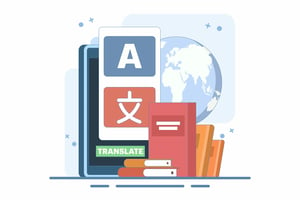In today's globalized world, language barriers can be a major obstacle to business success. Whether a company is expanding into new markets, working with international clients or collaborating with foreign partners, the need to communicate effectively in different languages is crucial. To overcome these barriers, companies often resort to translation or interpretation services. While both these services are common, translation and interpreting are distinct disciplines, each with their own methods, skills, and applications. Understanding these differences is essential to determining which service is best suited to an organization’s specific needs.
What is translation?
Translation focuses on converting written content from one language to another. This process involves a high level of accuracy and care, as the translator must ensure that the meaning, tone, and style of the original text are maintained in the translated version. Translators work with a variety of documents, including technical manuals, legal contracts, marketing materials, websites, etc. This means that translation is not just a word-for-word conversion, but rather it requires a deep understanding of the cultural context and the specific subject matter of the text.
Translators usually have more time to do their work than interpreters. They also use terminology dictionaries, glossaries and computer-assisted translation (CAT) tools.
What is interpretation?
Interpretation deals with the translation of real-time spoken language. Interpreters work in real-time, either speaking simultaneously (at the same time as the speaker) or consecutively (after the speaker has finished speaking). This job requires not only a deep knowledge of the source and target languages, but also exceptional listening skills, memory, and spontaneity. Interpreters must capture the speaker’s message and convey it clearly and accurately to the target audience, often without the aid of scripts or reference materials.
In this case, interpreters do not have the time to consult glossaries or terminology dictionaries as they work, unlike translators. Since interpretation happens in real time, interpreters must be very focused and prepare in advance to avoid making significant mistakes.
Differences between translation and interpretation
- Format: Translation deals exclusively with written content, while interpreting focuses on spoken language.
- Time: As we mentioned, translators often have more time, which allows them to carry out research, consult glossaries and use computer-assisted translation tools to ensure accuracy. On the other hand, interpretation occurs in real time, so it is not so easy to consult glossaries or dictionaries. Interpreters usually research the topic in advance.
- Accuracy: Accuracy is essential in translation. Translators carefully review and edit their work to ensure that the final text is as accurate as possible. However, although accuracy is also important in interpretation, understanding and effective communication are prioritized over absolute accuracy due to time constraints.
- Languages: Translators generally work in a single direction, translating into their native language to ensure the text’s fluency and naturalness. However, interpreters must be able to work in both directions, translating both to and from their native language instantly.
- Revision: The translation process includes revision and correction stages to ensure the quality of the translated text. However, this is not possible in interpretation.
How to know what services a company needs?
It is necessary to take into account the different approaches that each language service brings to the table. Translators work with written information, while interpreters work with live spoken translation scenarios: conferences, meetings, medical appointments, court statements, etc.
With this in mind, it is important to note that both disciplines require highly qualified professionals with in-depth cultural and linguistic knowledge. These experts must not only master the language, but also understand cultural nuances, appropriate tone, and industry terminology.
One service or another will be needed depending on the circumstances. For handling contracts, technical manuals, any written document that requires detailed precision, marketing and advertising materials, website localization, or software applications, among others, translation is the solution. Translators can take the time to ensure that the terms, intent, and impact of the content are correct and relevant to users in different regions.
If a company or organization participates in international events, or manages legal proceedings, or even medical appointments, interpretation will facilitate live communication between participants speaking different languages.
We hope you found this information useful. We will be happy to provide you with our translation and interpretation services and answer any questions you may have. You can contact us or visit our blog for more information.

.jpg?width=370&height=200&name=Falsas-creencias-de-ciberseguridad%20(1).jpg)

